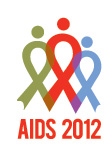 A new clinical trial of a novel drug-infused vaginal microbicide ring to prevent male-to-female transmission of HIV has opened in 17 clinical trials sites in five African countries, according to a National Institutes of Health news announcement and additional details discussed during a press conference at the XIX International AIDS Conference (AIDS 2012) in Washington, DC.
A new clinical trial of a novel drug-infused vaginal microbicide ring to prevent male-to-female transmission of HIV has opened in 17 clinical trials sites in five African countries, according to a National Institutes of Health news announcement and additional details discussed during a press conference at the XIX International AIDS Conference (AIDS 2012) in Washington, DC.
Microbicide Trials Network study 020 (MTN 020)—also known as “A Study to Prevention Infection with a Ring for Extended Use” (ASPIRE)—hopes to enroll nearly 3,500 HIV-negative women at risk for the infection. Results are expected in early 2015.
In July 2010, the CAPRISA 004 clinical trial found that a microbicide gel containing the antiretroviral (ARV) Viread (tenofovir) demonstrated a 39 percent level of efficacy at preventing HIV infection when applied vaginally within 12 hours before and within 12 hours after sex.
In November 2011, however, an interim review of data from another clinical trial—the VOICE study—revealed that the tenofovir gel was no more effective than a placebo gel at preventing HIV infection among females who used the microbicide once daily, regardless of the timing or frequency of sexual acts.
One possible, but unconfirmed, reason for the microbicide’s lackluster results in the VOICE study was poor adherence. Too few women in the trial used the gel as recommended, some experts have suggested.
Enter the ASPIRE study, which will explore a vaginal ring that can give women a discreet, long-acting HIV prevention method they control. This would be particularly helpful in situations where it is difficult or impossible for women to refuse sex, negotiate male condom use with their sexual partners or carefully plan microbicide gel applications.
The vaginal ring being evaluated in ASPIRE is made of silicone and contains the experimental ARV dapavirine. The drug is continuously released in the vagina and the ring needs to be replaced once every four weeks.
Other vaginal rings in development, according to presenters participating in a scientific session at AIDS 2012, contain the ARVs Invirase (saquinavir), Selzentry (maraviroc) and/or Isentress (raltegravir), with some being combined with hormonal contraceptives.
The ASPIRE study team, under the direction of Jared Baeten, MD, of the University of Washington in Seattle and Thesla Palanee, PhD, of the Wits Reproductive Health and HIV Institute in Johannesburg, South Africa, will enroll HIV-uninfected women between 18 and 45 years of age in Malawi, South Africa, Uganda, Zambia and Zimbabwe. The participants will be randomly assigned to receive either a silicone ring containing 25 milligrams of dapivirine or a placebo silicone ring.
During monthly study visits, the women will be tested for HIV and pregnancy and will receive condoms, counseling on how to reduce their risk of becoming infected with HIV and other sexually transmitted infections, and a new silicone ring. Women who become infected with HIV during the study will be told to discontinue using the silicone ring and will be referred to local medical care and support services.
Advertisement
Advertisement
Advertisement






2 Comments
2 Comments